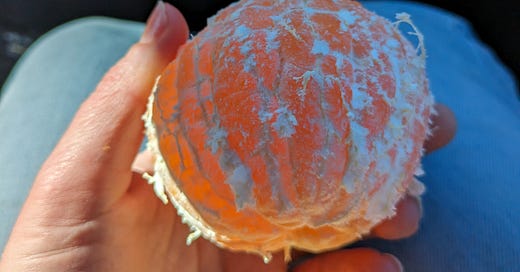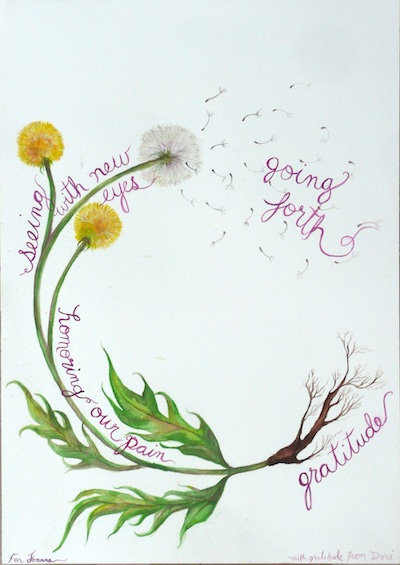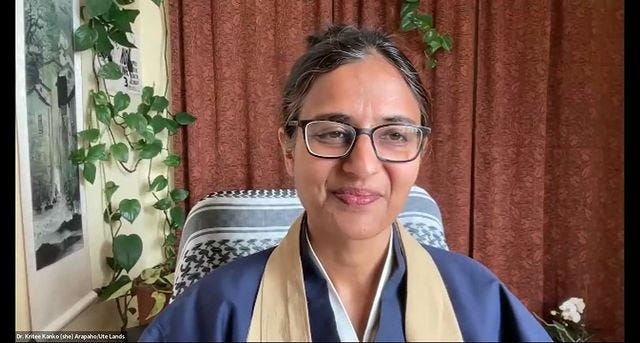How I Changed My Sh*tty Attitude About Gratitude
"You should be grateful" wasn't doing it for me
Hello friends. I need to confess something.
I used to suck at gratitude and hate it. Just the mention of the concept brought out my inner brat! Gratitude journals, gratitude lists, yuck. It always felt so forced, empty and obligatory. It felt like a parental expectation that I could never adequately fulfill, that I feel a certain way at a certain moment, and so I would end up feeling bad about myself on top of feeling disappointed in some obscure way.
Growing up, I remember many failures of gratitude. Once, in high school, for my birthday or Hanukkah, I had asked for a set of bed linens I saw in a catalogue that was printed with a photograph of a multicolored landscape and sunset. I thought they were gorgeous.
My parents tried. The sheets they actually bought were printed with a pretty pattern that resembled a twilight sky, but were not photographically detailed and were not at all the precise sheets I coveted. I don’t think I threw a tantrum, exactly, but I was disappointed, and they were disappointed that I was disappointed.
I had those sheets for years. They had a high polyester content and turned scratchy and pilly.
I brought this cycle of expectation and disappointment to my marriage. It took us years to work out how to lower the stakes on gift-giving occasions. (Hi babe, if you’re reading this, I loved the CBD bath salts and the chocolate and the nice hairbrush for Mother’s Day! And the flowers!!)
As a mom, however, I think my allergy to gratitude actually served me well, in that I didn’t at all or in any way expect my kids to be grateful to me. This was a relief emotionally, because you do so many things for your kids, day in, day out, and there’s just no way they could ever authentically respond.
Although I definitely, ritually, and to no real end, succumb to the social pressure to prod them to say thank you and write thank you notes. Research shows the better way to cultivate gratitude in your kids is to express your appreciation to them, for what they do, authentically and frequently.
When I discovered the work of Joanna Macy, I was always a little bit confounded by the fact that she starts her spiral journey with gratitude.
In my experience, it’s our broken hearts and the feelings we can no longer handle alone that bring us to this exploration in the first place. That always felt to me like step zero.
But before diving into the darkness, Macy’s exhortation is to resource and ground yourself by reminding yourself what you are grateful for. Including even, paradoxically, the pain itself that brought you there.
That is what the third episode of Joanna’s podcast with Jess Serrante that I produced, We Are The Great Turning, is all about.
Our podcast club is meeting again Thursday, May 23 at 7pm ET—if you want in, email in response to this Substack !
In this episode, Joanna expresses a moment of deep hopelessness. Jess asks her if they can connect to gratitude before they continue. Joanna says:
That’s right—we don't begin like that, as you remind me.
We can begin at any moment to just feel that we're breathing and be glad we can breathe. That we have lungs, that we have air, that there's oxygen. And... And we're sitting here together to let the truth of what we know and feel be spoken.
Ahhh.
The gratitude I’ve always found it impossible to summon on cue, seems to be connected with my expectations of the world. And it’s in my nature, as a human being, to be dissatisfied. I’ve always taken a lot of comfort in the Buddhist idea of dukkha— dissatisfaction. Dukkha is both not getting what you want, and getting what you don’t want—like those scratchy sheets.
The kind of gratitude Joanna is summoning in this moment isn’t about any expectation. It’s more like noticing. Noticing the absolute careless abundance of the gift of life. You’re already enjoying it, and now you enjoy even more by calling attention to your own enjoyment. It’s “wanting” what you have already got.
Nature isn’t standing over you saying, “How do you like that sunset? Is it just the one you wanted? Does it fit? Are you happy? Hmmm?” Nature just gives.
This kind of everyday gratitude I find it a lot easier to express to, and even hear from, my partner. Thanks babe for folding the laundry! Thanks for making dinner! Thanks for cleaning up the kitchen! Thanks for holding down the fort while I go to yoga! Maybe because he’s not necessarily expecting thanks or doing it for thanks. What I feel in return is gratuitous gratitude—given freely, not as part of an implied transaction.
I worked with the Finnish climate emotions researcher Panu Pikhala on a new written guide to exploring our Climate Emotions Wheel, and here’s what we came up with as a definition for gratitude.
Gratitude is a living thing’s essential orientation toward the many pleasures of being alive.
When a cat stretches and closes its eyes to the sunbeam—this is a gesture of gratitude.
We can also cultivate gratitude for our awareness of the truth, and even for climate pain, which reminds us of our connection to all of existence. Daily practice of gratitude can give strength even in dire circumstances. It coexists with, and informs, other climate emotions such as moral outrage.
What can you be grateful for right now, in this moment?
Here is a short video by Kritee Kanko, on why it’s so important to work on your own healing and joy as part of repairing the world.
LINKS
This week was Israel’s Memorial Day, Israel’s Independence Day, and the anniversary of the Nakba (catastrophe)— Palestinians’ displacement and dispossession in 1948 by Israel’s war of independence. I contributed some money to Standing Together, the Israeli-Palestinian peace group, which is starting an effort to escort the aid convoys into Gaza and ensure they reach their destination, while raising awareness for the catastrophe happening before our eyes right now.
Last week I had the privilege to spend time with some amazing federal conservation employees and other climate professionals at the US Fish and Wildlife Service's National Conservation Training Center in Shepherdstown, West Virginia, for a few days of conversations on climate, conservation and democracy. This was a roomful of people who have dedicated their lives to preserving species and ecosystems, taking a moment to think big picture about the meaning of their work in the context of threats to the overall systems that serve the flourishing of humans and all life.
Pete Dominick, an independent commentator and comedian with a strong interest in climate and democracy, invited me and interviewed me there for his daily podcast, Stand Up With Pete, which is worth subscribing if you want to join a community of smart, progressive folks. Our conversation begins at minute 27.
On ritual negativity in leftist politics:
If a fellow leftist asks, “How are you?”, you are not supposed to say, “Wonderful! I’ve fallen in love and also there are muskrats swimming in the pond.” Instead, you might allow an, “Okay, considering” — considering all the horrible things that are always happening in the world: war, climate crisis, exploitation, looming fascism. All this ritual negativity sits atop the fact that the work of left organizing is demanding, not always fun, and can take time away from the joyful parts of life, whether that’s time with friends, lovers and children, reading novels, or just sitting in the sun.









Anya- will the zoom link for the podcast club be the same as last time? I'm hoping I can make it this time!